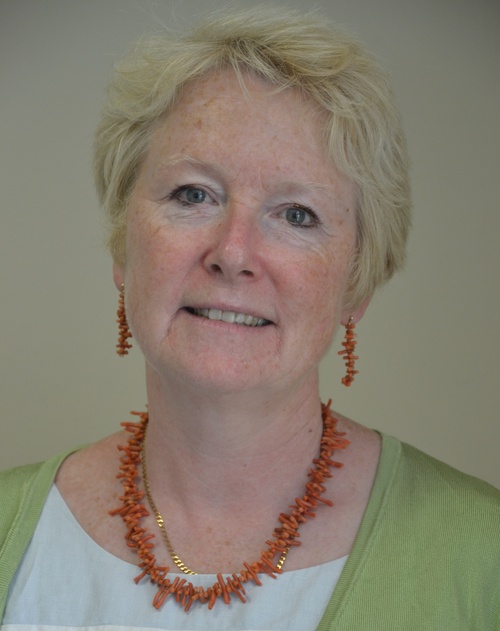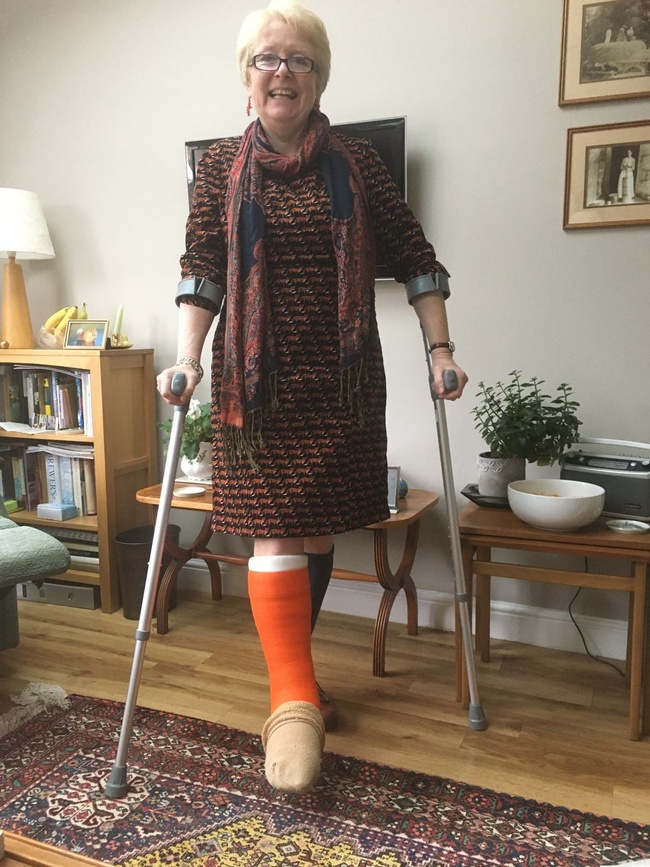LIVERYMAN PROFESSOR ALISON BAVERSTOCK REPORTS ON WHAT SHE LEARNED WHILE TEACHING PUBLISHING WITH A BROKEN ANKLE
16 JANUARY 2020

Originally seen in BookBrunch at the time of World Disability Day this article by Liveryman Professor Alison Baverstock brings us all up sharp and face to face with the realities of dealing with life when one's mobility is compromised.
Breaking news…
Towards the end of last year the UK was gripped by ‘Strictly’ Fever. One of the presenters, Claudia Winkleman had a particular way of arriving on set: walking forwards, waving to those behind her. In mid-October, doing just this (albeit on a wet road rather than a television studio) I managed to fall and break my ankle, in the process tearing all the ligaments. Arriving by ambulance at the West Middlesex Hospital, the A&E team expertly twisted it back into alignment. Once the swelling had gone down, the operation to pin it all back together took over four hours. X-rays show my right leg now contains scaffolding that resembles The Eiffel Tower.
The experience has significantly expanded my vocabulary (‘trimalleolar fracture’ – one which involves all three ankle-parts; ‘backslab’ – a three-quarter cast with a gap down the front, allowing a swollen limb room to further expand) but significantly reduced my mobility. Above all, I have found myself thinking about how society treats those with reduced mobility, and it is in this context that I now write.
There have been some significant learnings. I have a whole new empathy for those who are in this position all the time; a massive respect for disabled athletes operating from wheelchairs. Crutches are much harder work than they look; my upper body aches and my hands are sore; catching sight of myself using a walking frame makes me feel utterly decrepit.
Taking Ubers to and from work, so I can carry on teaching my Publishing students at Kingston University, is expensive but makes me feel more like myself – reminding me again how much I enjoy my job. I’ve taken the opportunity to offer a one-woman advisory service to drivers on why it matters that they read to their young children. All have seemed interested. Meetings can be conducted via Whatsapp, and I’ve had the odd experience of being carried on-screen, Tom Thumb-like, from meeting to break out-groups.
There have also been moments of pure joy, mostly for things I previously took for granted. Just before Christmas, sitting at my book group annual dinner, I felt overwhelmed by the simple pleasure of being there – with such a lovely group of long-term friends. Seeing a photograph of myself on social media the other day, I felt a rush of love for the simple status of being able to stand upright. As someone who has probably always taken on more commitments than I should, it’s frankly been beneficial to have time to notice the good things in life.
There are some less encouraging realisations too. My mother-in-law is fond of quoting ‘your health is your wealth’ and never has this felt truer. The NHS is wonderful, and I am deeply grateful for the expert care I received, but increasingly wondering how on earth they will cope if the supply of international staff, on whom they rely so heavily, find treating British patients less tempting after we leave the EU.
Why is it, when in my wheelchair, that those coming the other way tend to nod at whoever is pushing rather than the occupant? If they speak to me at all, it’s louder than necessary. If people park on pavements, wheelchair-users have to head into the road. The disabled loo may look a tempting option if no one else is around, but waiting outside for it to vacate is really hard if you are balancing on crutches, trying not to fall over. I simply can’t navigate the doors, narrow cubicles and general rush inside communal bathrooms. The able-bodied can.
I now feel permanently vulnerable: frightened of falling over again; suddenly aware of potential hazards everywhere: litter, leaves, slight gradients, loose dogs in tight spaces. And to this must be added a new fear; that of being ripped off. I’m thinking of you, so called tree expert, who called and agreed a price for pruning the big tree in our back garden. It was three days later, when I finally got upstairs in daylight and saw your work from above, I realised you had only trimmed the part visible from ground level – and you wouldn’t return to complete the full job for which you were paid. So is increased consumer vigilance another requirement for those of reduced mobility?
Thankfully there is progress. After six weeks in a bright orange plaster (these days you get to choose the colour – I selected

orange, but drew the line at glitter), I have had eight weeks in a boot, now with the opportunity to reduce to one crutch and start putting my full weight on both feet. Next week comes the start of lots of physiotherapy. But I am told it will be a whole year before the bones recover and I will never re-achieve full mobility. The end of skiing does not bother me much; I am far more concerned by whether I will still be able to reel, undertake long-distance walks or continue with the adventurous holidays my husband and I had embarked on after our four children left home.
Looking forward (but obviously no longer waving backwards at the same time) I am sure life will be different in future. I’ll be more cautious, more appreciative of the complex conjunction of bones and muscles at the end of my leg – and determined to speak to those in wheelchairs rather than above them.
Alison Baverstock is Professor of Publishing at Kingston University. She has much appreciated being treated at the West Middlesex Hospital. A former Army wife, she is the founder of Well Worth Reading, a scheme to encourage Forces families to connect through shared-reading, and which has been supported by The Stationers Company. www.readingforce.org.uk